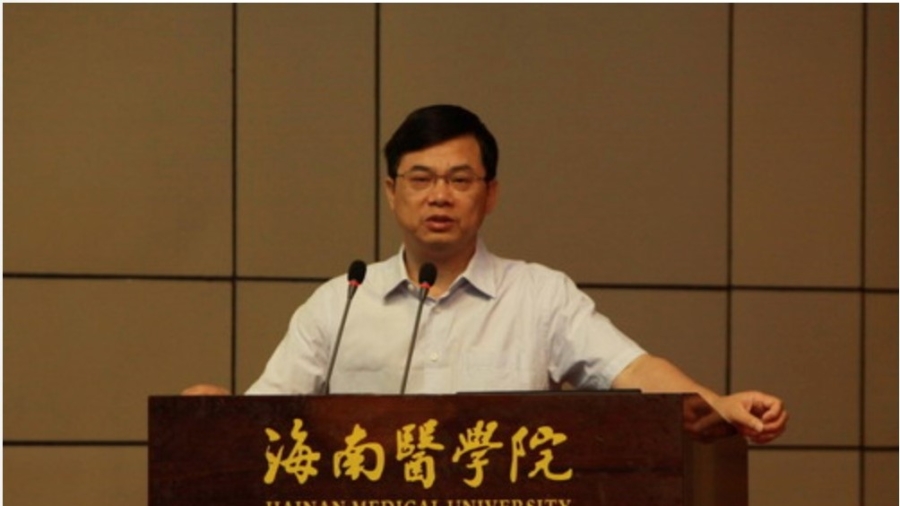A highly respected Houston scientist recruited by the Chinese regime as part of its international talent search has been arrested for allegedly possessing child pornography.
The arrest of Xie Keping, a professor in gastroenterology research at the University of Texas MD Anderson Cancer Center, has caused a sensation among the Chinese diaspora in America, and occurs in the context of heightened U.S. concern about Chinese scientists serving as conduits for research and technology from U.S. institutions back to China.
Discussion of Xie’s arrest on North American Chinese-language chat groups goes on for pages, with many messages simply saying “shocking news.” Xie is considered a leader of Houston’s Chinese community.
Police discovered the pornography when searching his work-issued computer for evidence of travel fraud, according to Vicki King, assistant chief of police at University of Texas Police at Houston. Xie is currently out on bail, awaiting to appear before the 208th Criminal District Court of Harris County.
Thousand Talents
Xie is one of 4,180 experts (the number as of 2014) recruited by China to return to the mainland and provide their expertise in what is called the “Thousand Talents Plan,” according to a report published on the program’s website.
He was recruited by the Shanghai East Hospital, which is affiliated to Tongji University. In 2010, he was listed as one of the “2010 High Level Overseas Experts” who attended a meeting in Beijing about the Thousand Talents Plan.
The “Thousand Talents Plan” was established in 2008 by the central government of China to recognize and recruit leading international experts in scientific research, innovation, and entrepreneurship.
In 2010, the program was elevated to be a top-level award given through China’s National Talent Development Plan, which was conceived jointly by the Central Committee of the Chinese Communist Party and the State Council of the People’s Republic of China in 2010 to strengthen innovation and international competitiveness within China.
In April, the U.S. National Intelligence Council produced an analysis that described the Thousand Talents Plan as “China’s flagship talent program and probably the largest in terms of funding.” The council raised concerns over its unadvertised goal “to facilitate the legal and illicit transfer of U.S. technology, intellectual property, and know-how” to China.
In a Senate subcommittee hearing on June 6, originally titled, “A Thousand Talents: China’s Campaign to Infiltrate and Exploit U.S. Academia” (the title was subsequently changed to “Student Visa Integrity: Protecting Educational Opportunity and National Security”), lawmakers discussed how Chinese students and scholars are possible threats to national security and potential intellectual property thieves.
The shock over Xie’s arrest among the Chinese community is partly because of his status as a credentialed member of China’s best intellectuals. But he was also recognized as a community leader in Houston, serving since 2009 as the president of the Chinese Civic Center, a community organization devoted to enriching Houston’s Chinese-language community and enhancing U.S.-China ties.
FBI Warning
Xie’s arrest occurred after FBI held an unprecedented gathering with top leaders of Texas academic and medical institutions to warn about foreign threats to research and academic institutions. The arrest also occurred amid reports of unusual turnover at the MD Anderson Cancer Center.
On social media, Chinese people are re-posting and debating information about Xie’s arrest, including the claim that other Chinese professors and employees are said to have been removed or asked to leave their posts amid FBI scrutiny. The Epoch Times has interviewed two employees of the Anderson Center who described these departures.
In response to the Epoch Times’ inquiry, the Anderson Cancer Center said, “As a state institution, The University of Texas MD Anderson Cancer Center does not comment on confidential personnel actions. MD Anderson follows all state and federal employment laws and, in particular, does not discriminate on the basis of race or nationality. MD Anderson has not dismissed anyone based on their involvement in the Thousand Talents Program.”
Neither Xie nor any other faculty and staff at MD Anderson have been charged with espionage.
Threats to National Security
Connor Hagan, spokesperson for the FBI’s Houston field office, wouldn’t comment on whether the University of Texas is a special target for FBI’s investigation. He did say the FBI is working closely with private partners and government agencies in the Houston area to ensure that federally funded research grants are guarded and protected against unscrupulous overseas enemies.
Joseph G. Morosco, the assistant director of the Office of the National Manager for Counterintelligence in the National Counterintelligence and Security Center, said in his testimony during the June Senate hearing, “There are many foreign academics and researchers currently attending U.S. institutions from nations that are strategic competitors, including Iran, Russia and the People’s Republic of China. We are particularly concerned about China because it is among the United States’ most formidable economic competitors.”
In an Aug. 8 press release warning of the danger of foreign threats to research, FBI Special Agent in Charge Perrye K. Turner said: “This elusive, yet deliberate theft of American research funds for the benefit of a foreign country’s economy strikes directly at our own economy. Our economic security is inherently tied to our national security. Through their exploitative efforts, foreign adversaries reduce U. S. competitiveness and deprive victimized U. S. institutions of important revenue that supports furthering scientific advances.”
From The Epoch Times

